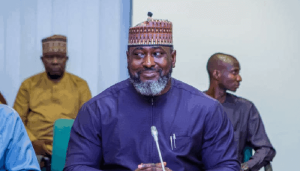The Chief Executive Officer of the Nigerian Economic Summit Group (NESG), Dr. Tayo Aduloju, on Thursday called for the rebasing of the country’s economy to stimulate new growth that is indispensable for crafting evidence-based policies to strengthen sectoral performance.
The is as the National Bureau of Statistics (NBS) has said data emanateing from the rebased Gross Domestic Product (GDP) would be unveiled in January.
Rebasing the Gross Domestic Product (GDP) is an internationally recognised measure of economic size and strength that provides the government with more clarity on the size of GDP growth, up-to-date data, an understanding of the economy’s true potential, and the foundation for sustainable growth.
Speaking at a joint sensitisation workshop by NESG and the National Bureau of Statistics (NBS) in Lagos, Aduloju said GDP rebasing is an exercise of profound significance, akin to cleaning the lenses through which the economy is viewed, allowing for a clearer and more accurate picture of its structure, size, and potential.
In 2014, Nigeria’s GDP rose to $510bn after rebasing and positioning it ahead of South Africa as the largest economy in Africa.
He added that Nigeria’s debt-to-GDP ratio, a critical indicator of fiscal health, dropped from 19 percent to 11 percent after the 2014 rebasing.
The leap, Aduloju said, was not fabricated but a reflection of reality that should be embraced.
He said, “As economies evolve, new industries emerge, technology transforms markets, and the contributions of different sectors shift.
“Without updated economic measurements, we risk underestimating our true economic capacity.
“The Nigerian Economic Summit Group, through one of its four strategic roles in the country, has continually watchdogged the economy and leveraged empirical analysis, evidence, and rigorous research to drive evidence-based policy advocacy.

“Today’s workshop, in collaboration with the National Bureau of Statistics (NBS), is yet another step in that direction to enhance the understanding and utility of key economic data.
“When we embarked on a similar rebasing, sectors like telecommunications, real estate, and the creative industries—once invisible in old metrics—came into full view.
“We must acknowledge the immense value of rebasing our economy to identify new growth engines, which are indispensable for crafting evidence-based policies to strengthen sectoral performance and enhance growth,” he said.
Aduloju cited India’s 2015 GDP rebasing, which highlighted IT and fintech as key growth drivers, while China’s periodic methodological updates ensured their data reflected structural shifts in technology, e-commerce, and advanced manufacturing.
These practices, he noted, underscore the need for Nigeria to remain relevant and competitive globally adding that through rebasing, Nigeria’s creditworthiness, would be improved, making it a more attractive destination for foreign direct investment.
According to him, investors are drawn to transparency and growth potential, and rebasing sends a clear message: we understand our economy, and we are open for business.
Aduloju further noted that rebasing sharpens policymaking by providing a detailed map of the economic terrain, enabling governments to identify high-growth sectors for scaling and low-growth sectors that require targeted interventions to drive impactful and balanced development.
He acknowledged that the NBS’s past rebasing efforts have often been met with skepticism and misconceptions, which have not only compromised the data’s perceived reliability but also undermined confidence in statistical processes.
Subsequently, he urged captains of industry, economic experts, analysts, private sector key players, and data users to utilise the workshop, engage deeply with the data, address concerns, and explore how these insights can guide business strategies and policies.
The Statistician-General of the Federation, Prince Semiu Adeniran, said rebasing is a vital exercise that ensures economic indicators are current and accurate reflections of the economic realities on the ground.
“As economies evolve, new industries emerge, and consumption patterns shift, Adeniran said it becomes imperative to update Nigeria’s statistical measures to capture these changes.
“If Nigeria is to make the desired progress and development, it is imperative that NBS, as the official producer of data, plays its role adequately in providing timely, accurate, and reliable statistics to inform all users, both in the public and private sectors, to enable them to design, plan, and implement policies and programs that will lead to the attainment of national objectives.
“Rebasing our GDP and CPI allows us to align with these transformations, providing a more precise and relevant picture of Nigeria’s economic landscape.
“This process is foundational to informed policymaking, strategic planning, and effective governance; hence, it is one exercise that the NBS is conducting with significant importance and professionalism.
“Our mindset in undertaking both critical assignments is to ensure that our processes are open, collaborative, and rigorous, making sure that, as much as possible, we will leave no stone unturned in our bid to measure and report accurately the size of the economy and the level of price changes.
“The rebasing exercise is designed to ensure that our economic indicators accurately reflect the current structure of our economy, incorporate new and emerging sectors, update our consumption baskets, and refine our data collection methods.
“This is our responsibility as the official producer of data in Nigeria,” Adeniran added.
Speaking further at the workshop, the technical assistant to the Statistician General, Moses Waniko, said data gathered would be validated and then launched at the end of the month.
He said, “We’re currently concluding the rebasing. We need to validate the results, and then we have to do a launch; we are looking at the end of January to do that launch, to disseminate the numbers, and then, usually, there are post-rebasing activities that will happen.”
“We expect that the size of the economy will be bigger.
“The tax-to-GDP ratio is something that people may want to see what the numbers would look like. Debt to GDP ratio of 18.5 per cent as of September 2019 could also reduce with the bigger size of the GDP, and then per-capita income will increase after the rebasing.”








